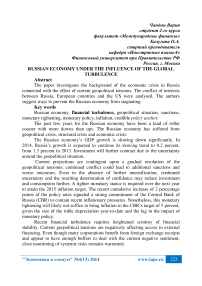Russian economy under the influence of the global turbulence
Автор: Чандни Вария, Калугина О.А.
Журнал: Экономика и социум @ekonomika-socium
Статья в выпуске: 4-5 (13), 2014 года.
Бесплатный доступ
The paper investigates the background of the economic crisis in Russia connected with the effect of current geopolitical tensions. The conflict of interests between Russia, European countries and the US were analysed. The authors suggest ways to prevent the Russian economy from stagnating.
Russian economy, financial turbulence, geopolitical situation, sanctions, monetary tightening, monetary policy, inflation, credible policy anchor
Короткий адрес: https://sciup.org/140110228
IDR: 140110228
Текст научной статьи Russian economy under the influence of the global turbulence
The past few years for the Russian economy have been a kind of roller coaster with more downs than ups. The Russian economy has suffered from geopolitical crisis, structural crisis and economic crisis.
The Russian economy’s GDP growth is slowing down significantly. In 2014, Russia’s growth is expected to continue its slowing trend to 0.2 percent, from 1.3 percent in 2013. Investment will further contract due to the uncertainty around the geopolitical situation.
Current projections are contingent upon a gradual resolution of the geopolitical tensions; continued conflict could lead to additional sanctions and worse outcomes. Even in the absence of further intensification, continued uncertainty and the resulting deterioration of confidence may reduce investment and consumption further. A tighter monetary stance is required over the next year to attain the 2015 inflation target. The recent cumulative increase of 2 percentage points of the policy rates signaled a strong commitment of the Central Bank of Russia (CBR) to contain recent inflationary pressures. Nonetheless, this monetary tightening will likely not suffice to bring inflation to the CBR’s target of 5 percent, given the size of the ruble depreciation year-to-date and the lag in the impact of monetary policy.
Recent financial turbulence requires heightened scrutiny of financial stability. Current geopolitical tensions are negatively affecting access to external financing. Even though many corporations benefit from foreign exchange receipts and appear to have enough buffers to deal with the current negative sentiment, close monitoring of systemic risks remains warranted.
The Russian economy, already slowing because of pre-existing structural bottlenecks, has been further affected by geopolitical uncertainties arising from conflict between Russia and Ukraine. Growth is expected to ease to 0.2 percent in 2014, with considerable downside risks. To safeguard against risks, the current macro framework should be further strengthened to provide a credible policy anchor.
Monetary policy should focus on reducing inflation, and more exchange rate flexibility should provide a buffer against external shocks. Adherence to the fiscal rule should continue, with additional consolidation in the outer years.
Revitalizing the government’s structural reform agenda is essential to provide the needed catalyst to growth.
Чаушьян Н.А.
Мартакова К.А.
Южный федеральный университет
Россия, г. Таганрог
ИНВЕСТИЦИИ В ЧЕЛОВЕЧЕСКИЙ КАПИТАЛ - ФАКТОР ЭКОНОМИЧЕСКОГО РАЗВИТИЯ РЕГИОНА
Основное богатство любого общества – люди, где в качестве главного критерием экономического роста является уровень человеческого развития и степень удовлетворенности его потребностей. Очевидно, что использование инструментов расширения человеческого капитала – повышение уровня и качества образования, медицинского обслуживания, питания, проживания, способствуют экономического росту. Человеческий капитал рассматривается как способности, знания и умения работников, позволяющие им функционировать в социально-экономической среде. Человеческий капитал является формой выражения производительных сил человека на постиндустриальной стадии развития общества с социальноориентированной экономикой рыночного типа [5].
Человеческий капитал – это полученный в результате инвестиций и накопленный человеком определенный запас здоровья, знаний, навыков, способностей, мотиваций, целесообразно используемых я в той или иной сфере общественного воспроизводства и содействующих росту производительности труда и эффективности производства, что приводит к повышению доходов человека, фирмы и всего общества в целом [2].
В любой развитой стране, инвестиции в человеческий капитал незаменимый, базисный фактор экономического роста и повышения кон-конкурентоспособности страны. Исходя из чего, важнейшим условием достижения устойчивости развития экономики выступает накопление и сохранение человеческого капитала, создание и реализация стратегий, мотивирующих людей повышать свои знания, совершенствовать навыки и
"Экономика и социум" №4(13) 2014


